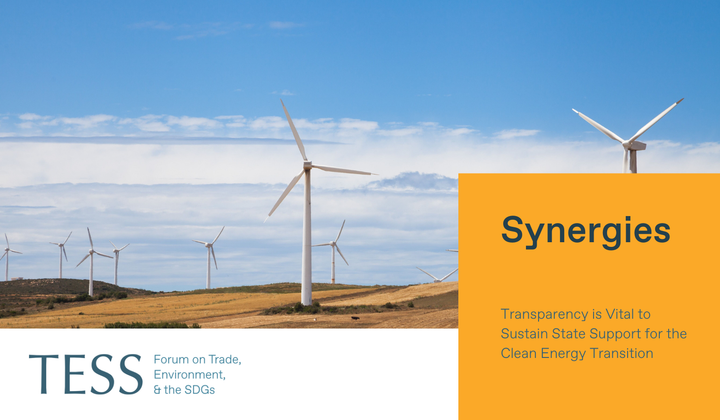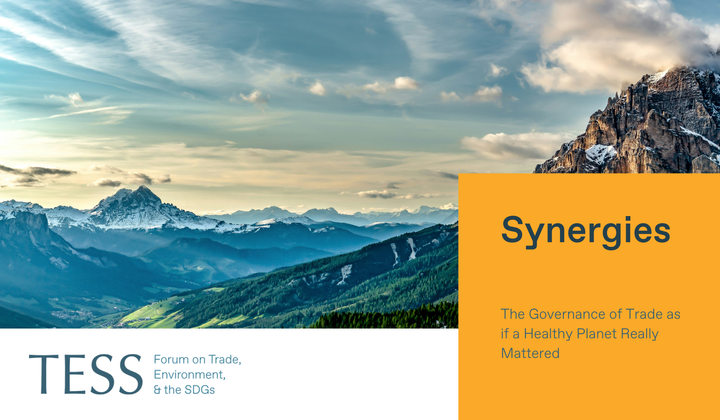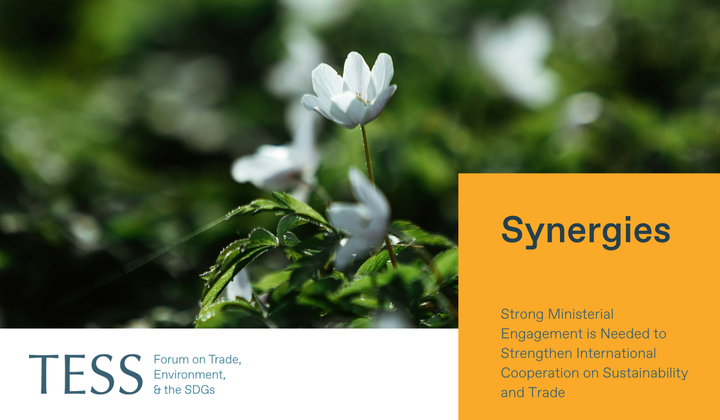On the heels of a largely disappointing ministerial conference, it remains imperative to uphold stakeholder support for existing efforts that promote the reinvigoration of the WTO’s deliberative functions. The organization’s multilateral sustainability agenda should stand at the front and centre of such endeavours.
This article is part of a Synergies series on reviving multilateralism curated by TESS titled From Vision to Action on Trade and Sustainability at the WTO. Any views and opinions expressed are those of the author(s) and do not necessarily reflect those of TESS or any of its partner organizations or funders.
-----
The urgent need for international cooperation on policies at the intersection of climate and trade is a prominent feature of contemporary debates among governments, private stakeholders, think tanks, and academia around the world.
Trade and policy fragmentation resulting from uncoordinated environmental standards, national carbon markets, and green industrial subsidy races risk jeopardizing the climate benefits derived from trade by reducing efficiency, raising costs, and reinforcing existing international economic inequities.
The World Trade Organization (WTO) and other international organizations had pulled out all stops in their efforts to raise awareness for the imperative of international climate and trade policy coordination. Events such as the WTO Public Forum and the first-ever “Trade Day” at the 2023 UN Climate Conference (COP28) last December highlighted the crucial role international trade plays in supporting climate change adaption and mitigation through green supply chains and technological innovation.
However, those who may have expected that increasing public prominence of the climate and trade policy nexus would result in expedient progress or even tangible results at the recent Thirteenth WTO Ministerial Conference (MC13) (26–29 February 2024) were to be disappointed. Opposition from a handful of WTO members to “new” agenda items, the sputtering of the WTO’s negotiation engine, and unfavourable geopolitical conditions have forced more managed expectations; this has redefined what constitutes “success” when it comes to WTO-centred processes in general, and the WTO’s so far “informal” sustainability agenda in particular.
The merit of WTO outcomes on sustainable trade should be assessed not against ideal world scenarios and dated hopes for binding multilateral agreements ready for national implementation, but against more realistic benchmarks. Consensus to revitalize the work of the WTO Committee on Trade and Environment in the near term—including through more sessions on thematic issues—as well as convergence on non-binding instruments, best practice principles, and codes of conduct to guide national policy practices, would make for valuable achievements in the medium term.
The merit of WTO outcomes on sustainable trade should be assessed not against ideal world scenarios and dated hopes for binding multilateral agreements ready for national implementation, but against more realistic benchmarks.
Premature Optimism for Climate Change Progress at MC13
Recent momentum in international climate negotiations under the auspices of the United Nations Framework Convention on Climate Change (UNFCCC) may have fuelled some short-lived optimism for similar progress on sustainable trade issues at MC13. After all, the last Ministerial Conference (MC12) acknowledged the urgency of addressing global environmental challenges like climate change and reaffirmed the need to support developing countries, especially least developed countries, in achieving sustainable development.
Preparatory work on behalf of some WTO members had aimed to at least put the most pressing trade policy-related sustainability issues on the agenda of the WTO’s multilateral committees. These efforts include proposals focused on addressing trade and global environmental challenges more broadly, new-era industrial policies, the link between environmental measures and development, and integrating developing countries into sustainable supply chains. For example, a February 2023 European Union communication to WTO members exemplifies this effort by outlining a pragmatic approach to “Reinforc[e] the Deliberative Function of the WTO to Respond to Global Trade Policy Challenges.” China also supports multilateral discussions on carbon and reinvigorating the WTO’s Committee on Trade and Environment.
The procedural modesty and pronounced incrementalism that characterize these proposals has likely been inspired by a recognition of the complexities of the issue at hand as well as contemporary geopolitics that have generated a highly challenging environment for trade multilateralism.
The procedural modesty and pronounced incrementalism that characterize these proposals has likely been inspired by a recognition of the complexities of the issue at hand as well as contemporary geopolitics that have generated a highly challenging environment for trade multilateralism. It may also reflect lessons learned from over two decades of long-lasting fisheries subsidies negotiations, which MC13 was still not able to get across the line—a huge disappointment for many.
Inconvenient Truths
First and foremost, MC13 has delivered a severe disappointment to those who expected more on climate-related trade issues. Hopes had focused on a Ministerial Declaration that would go beyond a paragraph recalling existing “sustainable development” commitments as per the 1994 Marrakesh Agreement establishing the WTO; instead the Abu Dhabi Declaration does just that. At the end of the summit, literal reference to climate change only featured as support provided by all members regarding the Committee on Technical Barriers to Trade and its progress on member-driven work on the issue alongside, inter alia, sustainable development.
Prior to MC13, India in particular had repeatedly made clear that environment and climate do not belong on the WTO’s agenda and signalled opposition to any related multilateral work programme, including through direct and pronounced opposition to the proposals put forward by the European Union. During the WTO conference itself, indeed, Indian Minister of Commerce Piyush Goyal prominently took to the media, to argue that trade and the environment “are two separate issues,” while omitting that India had joined Brazil, China, and South Africa in their attempt at COP28 last December to place unilateral trade measures related to climate change on the formal negotiation agenda.
Given India’s longstanding reluctance to add “new” issues to the multilateral trade agenda, its insistence may have come as no surprise to the more seasoned observers of the WTO-centred negotiation process. However, the Indian opposition to formally integrating deliberations on the climate and trade policy nexus issues into the WTO agenda stands in sharp contrast to an increasing number of developed, developing, and least developed WTO members who wish to address sustainable trade policy challenges in the most inclusive setting. And to some extent, it also stands in contrast to India’s recent contributions to related deliberations at the Committee on Trade and Environment.
The best illustration of this circumstance may be the emergence of a Ministerial Declaration on the Contribution of the Multilateral Trading System to Tackle Environmental Challenges—an initiative led by Paraguay and co-sponsored by 15 other developing country members (but not India!) in addition to the African Group. The document calls for enhanced transparency on trade related environmental measures; calls on members to refrain from unilateral protectionism disguised as environmental measures; highlights links between sustainable trade and climate finance; supports trade cooperation on sustainably produced goods; emphasizes the importance of cooperation on climate technologies; and overall underscores the importance of multilateral cooperation on trade-related environmental measures at the WTO. Many of the same developing country sponsors (Paraguay, the African Group, and Brazil amongst others) were also among the 112 supporters (alongside developed countries such as the European Union and the United States, amongst others) of the climate related Ministerial Declaration on Strengthening Regulatory Cooperation to Reduce Technical Barriers to Trade. These constructive initiatives undermine one narrative that developing countries are dogmatically opposed to multilateral cooperation addressing the climate emergency.
These constructive initiatives undermine one narrative that developing countries are dogmatically opposed to multilateral cooperation addressing the climate emergency.
Indian opposition could be interpreted as a bargaining strategy that leverages its veto power on sustainability issues to gain ground with regards to India’s agricultural trade policy priorities in WTO negotiations. As a side-effect, however, India’s absence from the aforementioned initiatives inflicts considerable collateral damage on Global South solidarity.
Chances are high that India’s stance will, if upheld, further force an even more pronounced shift of efforts towards advancing deliberations on climate and trade nexus policy measures in plurilateral WTO initiatives that typically include a much smaller subset of WTO members. Worse, it may make WTO-external fora, such as the G7’s Climate Club initiative with its OECD Interim Secretariat (and only 38 members) as well as the OECD’s Inclusive Forum for Carbon Mitigation Approaches (with currently 55 members) serious institutional alternatives for climate and trade nexus policy cooperation. Finally, India’s position is grist to the mill of those who contend that unilateral policy approaches are a contemporary necessity.
Some Progress on the Plurilateral Front
At MC13, the WTO’s member-led Trade and Environmental Sustainability Structured Discussions (TESSD), presented a political statement by the co-convenors, an updated work plan, and a series of outcome documents summarizing the work of its four working groups on environmental goods and services, trade‑related climate measures, circular economy – circularity, and subsidies. Yet, these reports represent modest progress and the 2024 work plan from the 76 TESSD members illustrates modest ambitions, promising only to "guide work towards identifying possible concrete actions or recommendations by the next ministerial conference.” The New Zealand-led Fossil Fuel Subsidy Reform (FFSR) initiative, co-sponsored by a 48-country strong subgroup of TESSD members, presented an updated Ministerial Statement and a work programme towards MC14. Another member-led initiative, the Dialogue on Plastics Pollution (DPP), comprising 76 co-sponsors, succeeded in agreeing on a joint MC13 Ministerial Statement reflecting the work to date, identifying areas for voluntary individual and collective actions on trade dimensions of plastic pollution.
However, while almost half of the DPP co-sponsors are developing countries, currently only a handful of least developed countries and small island developing states are members of the TESSD. This may reflect capacity constraints or concerns that the agenda does not fully prioritize their interests (e.g. adaptation, technology transfer). But it may also indicate their very preference to continue discussions in multilateral WTO committees (e.g. the Committee for Trade and Environment, the Committee on Technical Barriers to Trade, or the Committee on Subsidies and Countervailing Measures).
Ministerial Engagement
It is also notable that MC13 featured, for the first time, ministerial roundtables on industrial policy and sustainable trade, which, however, did not deliver more than symbolism and pre-prepared statements on good intentions (and the informal talks which had begun in 2023).
The Coalition of Trade Ministers on Climate—a WTO-external initiative launched in 2023 to promote policy coordination at the intersection of trade, climate, and sustainable development—met for the second time to give impetus to their attempt to bridge the gap between the trade and climate change regimes. On that occasion, the 61 members of the coalition released a Communiqué and a Menu of Voluntary Actions. While this effort is a useful addition to provide open and constructive dialogue, it must avoid the impression that it creates an alternative forum on climate and trade nexus cooperation outside of the WTO.
The Way Forward
A realistic yet ambitious benchmark for success on sustainable trade issues could be defined as a revitalization of the WTO’s Committee on Trade and Environment in the nearer term, as well as convergence on non-binding instruments, best practice principles, and codes of conduct to guide and coordinate national policy approaches.
While the developments outlined above illustrate highly desirable enhanced intensity of WTO members’ engagement on sustainable trade issues at various levels, they also showcase the massive distance of travel to ideal-world outcome scenarios. It therefore remains crucial to manage expectations regarding immediate, binding agreements on the climate, trade, and development nexus within the WTO against the background of contemporary geopolitical contingencies that increasingly display the prevalence of national interest conflicts over self-interested multilateral cooperation.
The discursive value of the WTO as a diplomatic forum can, under favourable conditions, result in enhanced coordination of national policy approaches. Beyond mere system preservation, a realistic yet ambitious benchmark for success, as noted above, could be defined as a revitalization of the WTO’s Committee on Trade and Environment in the nearer term, as well as convergence on non-binding instruments, best practice principles, and codes of conduct to guide and coordinate national policy approaches: for instance, with regards to the design of internationally interoperable carbon markets and carbon border measures, least-trade restrictive green industrial policy measures, as well as regarding transfers of climate-related technologies.
It remains imperative, against this background, to uphold rather than prematurely abandon stakeholder support for existing efforts that promote the reinvigoration of the organization’s deliberative functions. Thematically, the WTO’s—currently mostly informal—multilateral sustainability agenda should stand at the front and centre of such endeavours.
-----
David Kleimann is a Senior Research Associate for ODI’s International Economic Development Group and ODI Europe.
Jodie Keane is a Senior Research Fellow with the International Economic Development Group at ODI.
Michai Robertson is a Research Fellow within the Climate and Sustainable Programme at ODI.
The authors would like to acknowledge the helpful comments from reviewers of this piece including Sheila Page, Senior Research Associate ODI, Peter Ungphakorn, freelance journalist, Ron Steenblik, and Christophe Bellmann, Head of Policy Analysis and Strategy TESS. All errors remain the authors’ alone.
A previous version of this article was published in ODI Insights.
-----
Synergies by TESS is a blog dedicated to promoting inclusive policy dialogue at the intersection of trade, environment, and sustainable development, drawing on perspectives from a range of experts from around the globe. The editor is Fabrice Lehmann.
Disclaimer
Any views and opinions expressed on Synergies are those of the author(s) and do not necessarily reflect those of TESS or any of its partner organizations or funders.
License
All of the content on Synergies is licensed under a Creative Commons Attribution-NonCommercial-ShareAlike 4.0 International (CC BY-NC-SA 4.0)
license. This means you are welcome to adapt, copy, and share it on your platforms with attribution to the source and author(s), but not for commercial purposes. You must also share it under the same CC BY-NC-SA 4.0 license.
If you would like to reuse any material published here or if you have any other question related to Synergies, send an email to fabrice.lehmann@graduateinstitute.ch.



